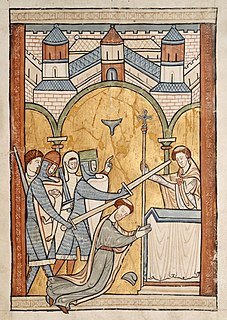A Quote by R. C. Sproul
We live in a time of crisis in the secular culture and in the church with regard to the beautiful.
Related Quotes
The church is only the church when it exists for others. To make a start, it should give away all its property to those in need. The clergy must live solely on the free-will offerings of their congregations, or possibly engage in some secular calling. The church must share in the secular problems of ordinary human life, not dominating, but helping and serving. It must tell men of every calling what it means to live in Christ, to exist for others.
My position on the issue of homosexuality is no different from the position of the Anglican Church and all the major denominations around the world. I know that it's different from the secular culture in the western world, but it's no different from the teaching of the church globally. We're Christians basically.
Has God no living church? He has a church, but it is the church militant, not the church triumphant. We are sorry that there are defective members, that there are tares amid the wheat. . . . Although there are evils existing in the church, and will be until the end of the world, the church in these last days is to be the light of the world that is polluted and demoralized by sin. The church, enfeebled and defective, needing to be reproved, warned, and counseled, is the only object upon earth upon which Christ bestows His supreme regard.
The Church is holy, although there are sinners within her. Those who sin, but who cleanse themselves with true repentance, do not keep the Church from being holy. But unrepentant sinners are cut off, whether visibly by Church authority, or invisible by the judgement of God, from the body of the Church. And so in this regard the Church remains holy.
The Church of Christ is constituted in two orders, the clergy and the people, the one having the care of the Church that all may be ruled for the salvation of souls; the other contains kings, princes, and nobles who have to carry on secular government that all things may lead to the peace and unity of the Church.
At this time of crisis we cannot be concerned solely with ourselves, withdrawing into loneliness, discouragement and a sense of powerlessness in the face of problems. Please do not withdraw into yourselves! This is a danger: we shut ourselves up in the parish, with our friends, within the movement, with the like-minded... but do you know what happens? When the Church becomes closed, she becomes an ailing Church, she falls ill! That is a danger. . . .A Church closed in on herself is the same, a sick Church.





































